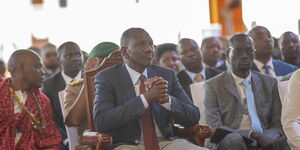The iconic Kenyatta International Convention Centre (KICC) would have had a second wing had two ministers in Mzee Jomo Kenyatta’s government worked together.
The lucrative deal for phase 2 of the building pitted Joseph Murumbi, the Kanu Treasurer and a former minister against James Gichuru, the Minister for Finance.
After the completion of Phase I President Jomo Kenyatta personally wrote to KCC to submit tender for phase II of the building.
Murumbi pushed for the construction tender to be awarded to Humphry Berkeley, who represented John Howard.
The Briton hoped to raise funds for the project through his own company, Investeco Ltd, on whose board he had appointed Murumbi.
Berkeley found a lender who was ready to put in Ksh 220million at a rate of 8.5 % over 25 years.
According to the Sunday Nation, he expected to get an additional ksh 65million from locally represented British banks.
He alleged that Kanu investment trust which was to own the building would earn approximately Ksh 21million annually after the repayment of the interest and the principal.
However assessments by the Ministry of Public Works showed that the estimates would result in insufficient gross revenue to meet diminution costs.
Berkeley suffered a setback when the lender withdrew the offer.
It was feared that in case it was reinstated then it would be at a higher interest rate.
It was at this point that the Israelis made a counter-offer through James Gichuru.
The Britons asked the British Foreign and Commonwealth Office to step in citing their offer was better and that acceptance of the Israeli proposal would be purely politically motivated.
A letter written on Jan 29, 1969 by the British High Commissioner to Kenya Sir Eric Norris read:
“Given that the Israelis often set in a manner detrimental to our interests when they infiltrate into African countries, our aim should be to hold them as far as we can to their present position in Kenya.
Consequently, Murumbi wrote to then Vice-President Daniel Arap Moi urging that a final decision on the awarding of the contract should to be made.
While this letter was being delivered on July 3, 1969, an Israeli delegation led by Minister Abba Eban lobbying for Solel Boneh, the contractor for the phase one of the project.
With the fate of KCC almost sealed, its directors made attempts to reach Gichuru, but he couldn’t be located.
With the British and Israeli firms in conflict about the tender, the idea to add another marvel to the Nairobi Skyline slowly fizzled out until it was completely shun.












